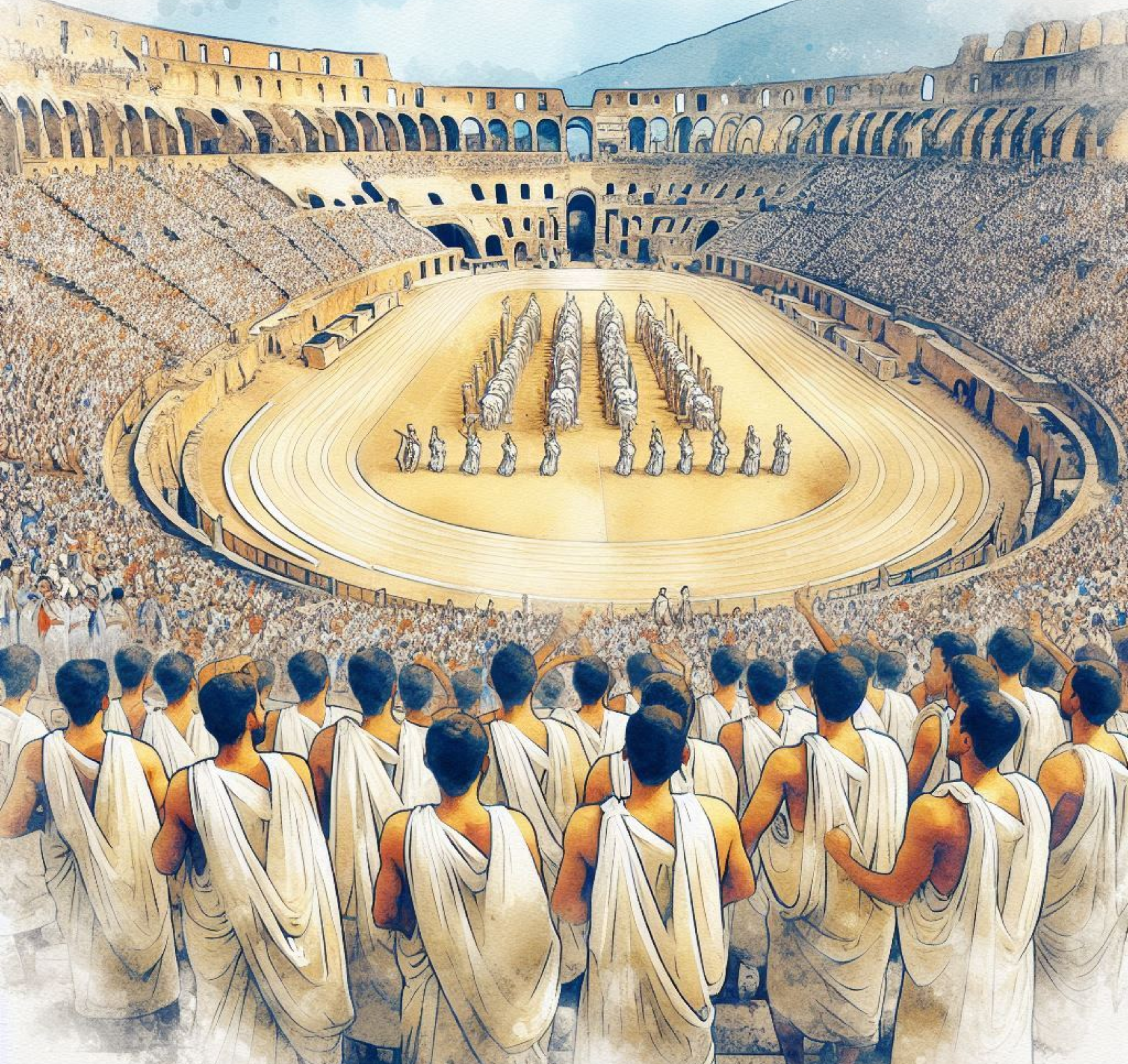In part 1 of 2 Olympic-themed Not-So-Romantic Blogs, we look at the very start of the Olympic games in 776 BCE.
I will state that these are known as the first recorded Olympic games so there was probably sporting events before- but for all tense and purposes 776 BCE was the first Olympic games. They are now known… as the Ancient Games.
Table of Contents
Origins and Olympia
The Ancient games were held in Olympia, Greece. For context, Olympia isn’t near Mount Olympus, the mythical home of the Greek Gods. Olympia is in the West and Mount Olympus is in the North. You may wonder why I added that… it’s definitely not because I thought Olympia was near Mount Olympus.
The Ancient Olympic Games were part of a huge religious ceremony to honour Zeus who was the father of Gods in Ancient Greek religion and were held every four years. This made the Ancient Games an equal part religious and sporting event. The games were a massive deal for everyone involved.
They were so important that for the duration of the games all wars, disputes and mild arguments had to be put on hold in a nationwide ceasefire- known as a echiciria. This allowed people to travel safely to Olympia to witness the games.
I’m surprised I’ve made it this far into the blog before saying this but the Ancient Olympic game athletes had to take part naked. You would certainly have to be more careful with the javelin. And I bet wrestling was interesting… with everything… well… flapping about.
They were also covered in olive oil.
No women were allowed to participate in the Olympic Games, their only role was training the horses for the equestrian events. Cynisca of Sparta (possibly the coolest name I’ve ever heard) was the first women trainer to win at the Olympic games. She hired a team of men to drive the chariots pulled by the horses she’d trained. They were victorious in the 396 and 392 BCE Olympic Games.
These victories had huge effects on women in Ancient Greece as other women went on to have great success. It shamefully wasn’t until the 1900 Olympic Games in Paris that women were allowed to compete… and even then it was only in five events.
Olympia itself contained a huge seated statue of Zeus inside the Temple of Zeus. It was one of the seven wonders of the ancient world – alongside the Great Pyramid of Giza, the Hanging Garden of Babylon, the Colossus of Rhodes, the Temple of Artemis at Ephesus, the Mausoleum at Halicarnassus and the Lighthouse of Alexandria.
Sadly the statue of Zeus hasn’t survived into the modern day after being destroyed in either the 4th or 5th century… I wish I could be more accurate or precise.
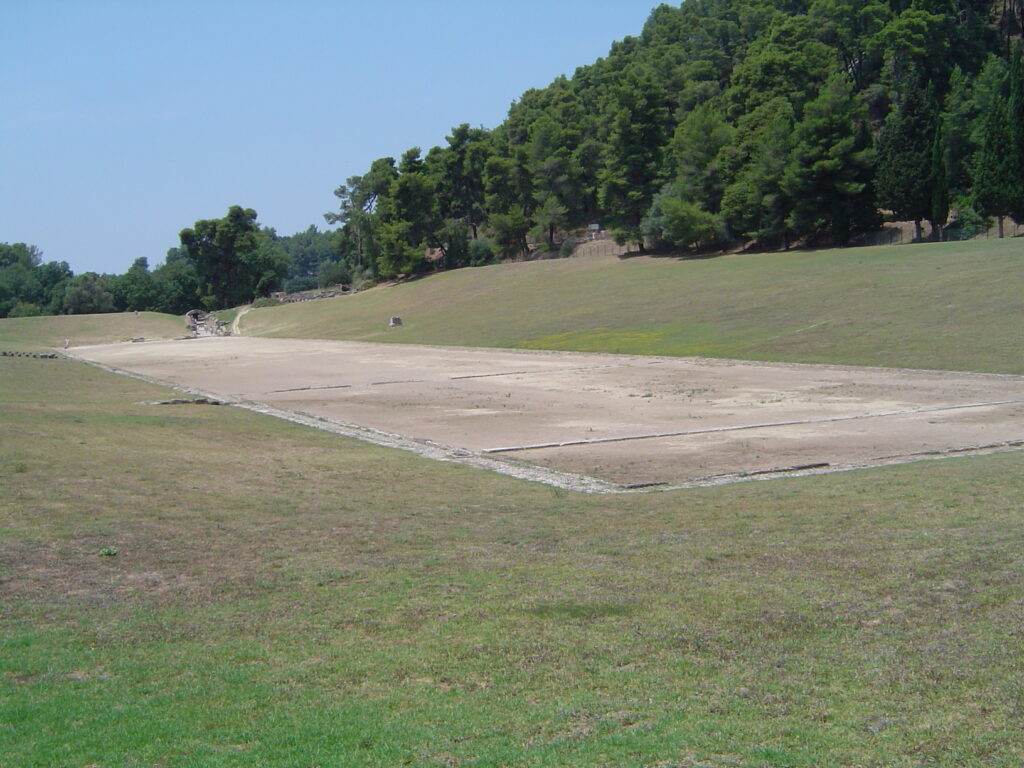
The events
Some of the events of the ancient games were very similar, if not exactly the same, to some of the events that take place in the Olympics today.
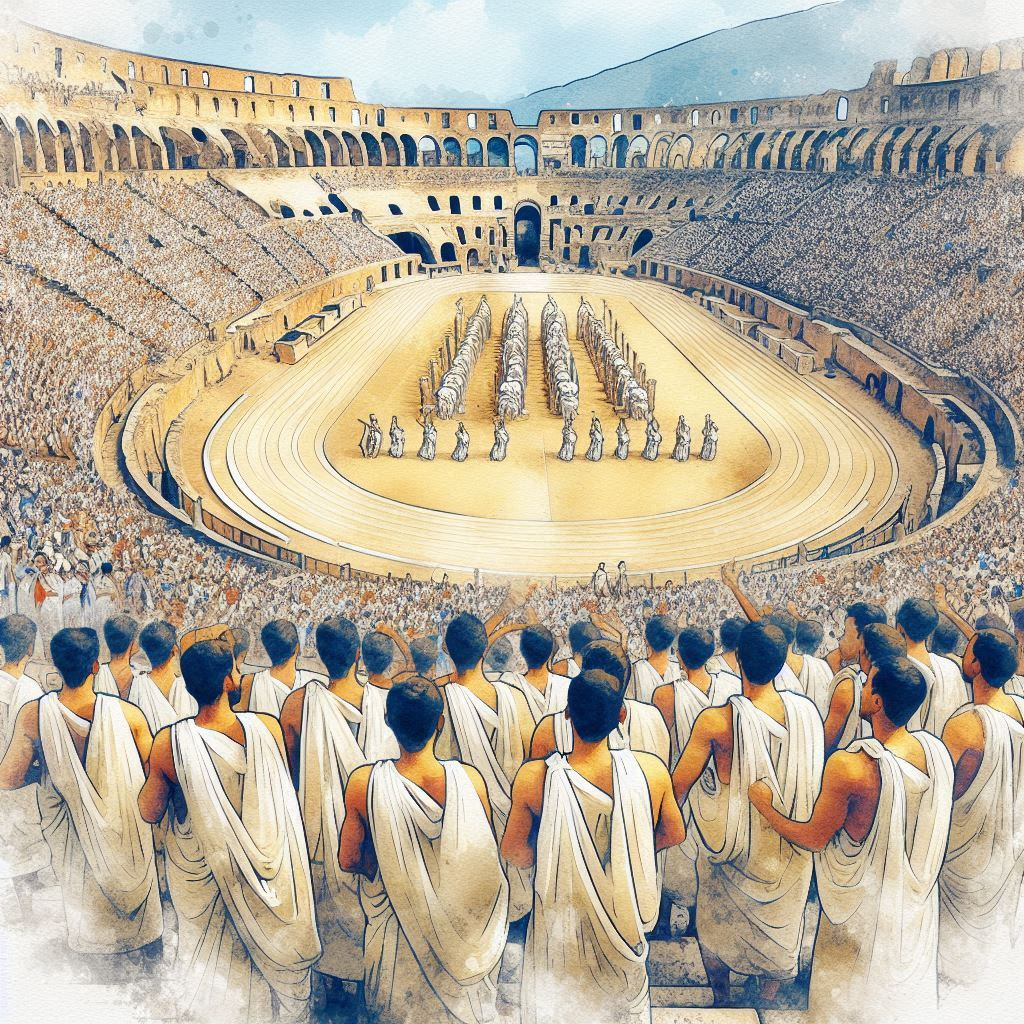
Running –
Just like in today’s Olympics, running in the ancient games were one of the main spectator events. I’ve got to be honest… I still don’t see why running events are always seen as the “prestigious” events at the Olympic games… you’ve seen the kayaks right? That stuff is insane.
The games of ancient times had 4 different running events and all took place on a track that was roughly 185 meters long. All the runners were naked and bare foot. I’m not going to comment on how uncomfortable that probably would have been… it’s uncomfortable to run bare foot on stone.
One of the big differences between modern and the ancient Olympic games is that the running race length would change slightly from stadium to stadium as they weren’t the same side. So one length in Olympia would be different than on length in Delphi.
The first race was the Stadion race. This was a single length of the track, so, in Olympia, this was a race of about 192 meters. This race was actually the only event at the Olympics until 724 BC. The first winner was a baker from Elis called Coroebus- which I’m actually really tempted to change my name to. It’s just more impressive and memorable than Andy. Coroebus Lickley sounds actually incredible.
A second race was added called the Diaulous and – in a complete madness of creativity- was 2 lengths of the track. The Diaulous was added into the Olympics in the 14th iteration, in 724 BCE.
A third running race was added in 720 BCE called the Dolichos race… all we can safely say about this, is that it was longer than 2 lengths. Why so inaccurate? Simply put, historians argue how long it was. It averages out to about 12 lengths of the track. The first champion of the Dolichos was Acanthus of Sparta- who also won the Diaulous as well.
The fourth, and final, running event to be added the Ancient games was the Hoplitodromos. It wasn’t added until the 65th Olympics in 520 BCE. The biggest difference between this and the other three races was that you didn’t have to run in the nude!
You did run in greaves (armour shin pads), a shield and a helmet. I’m not
I’m not sure which one I’d prefer.
Combat sports
There were also combat sports added to the Ancient games.
There was wrestling, boxing and a pankration (a mixture of wrestling and boxing).
Wrestling was exactly how you’d imagine it being. Two olive oiled up men trying to pin each other to the floor.
Boxing as well wasn’t much different to what it is today… minus them not wearing boxing gloves or protective gear like gum shields or helmets. There wasn’t any points so it I suppose it was more like that weird fighting thing people go and watch where people beat each other up… I don’t see the attraction. Boxing itself was added to the games in 688 BCE.
Pankration was a mixture of the two other combat sports. There were no rules apart from no biting or eye gouging. Pankration was apparently invented by Hercules. The aim of this sport was to get your opponent to surrender. To surrender, a competitor would have to raise their index finger. The only problem to this many competitors weren’t able to do this as they’d taken such a beating so lots of people did die during this event.
If there were no rules, why did nobody just bring a sledgehammer?
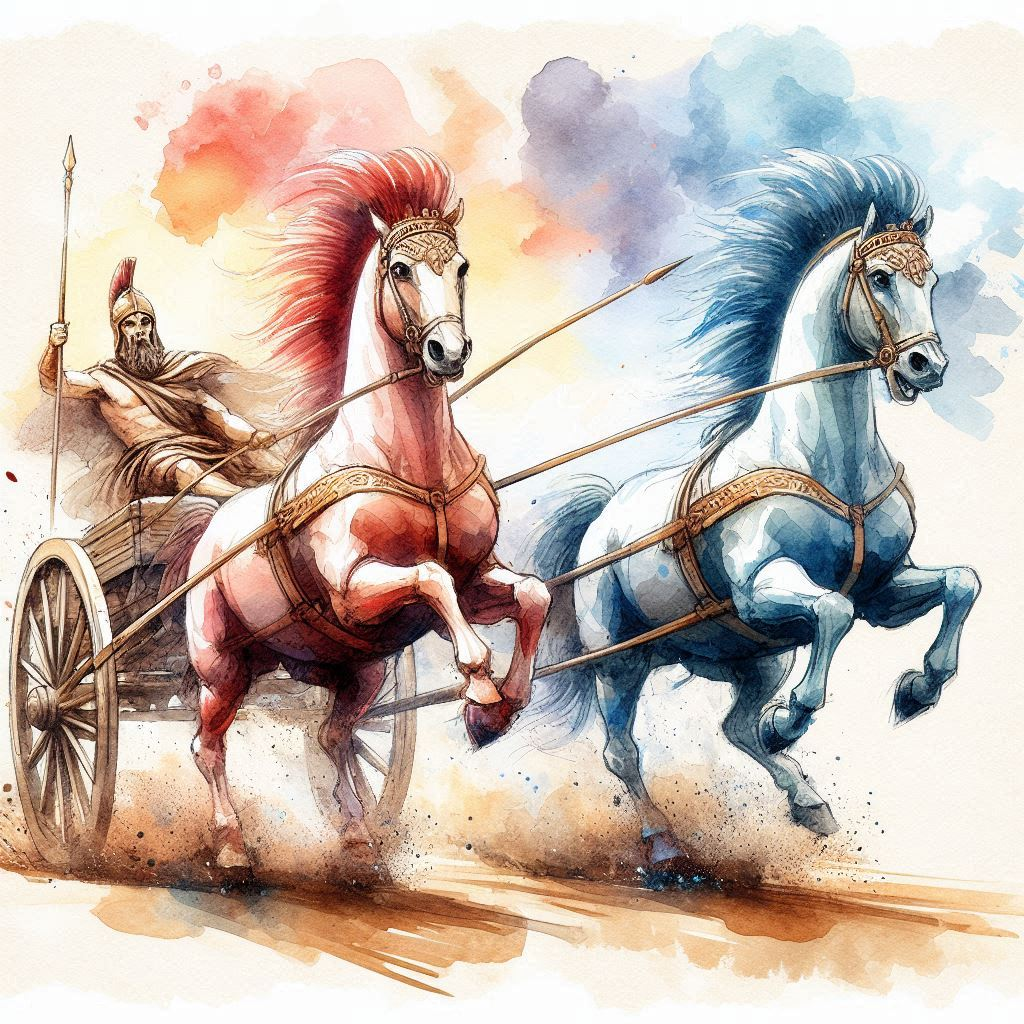
Throwing Events
Just like today, some throwing events took place. In the Ancient Games, they were Discus (basically a frisbee) and Javelin.
The first Discus were made out of stone… heavy.
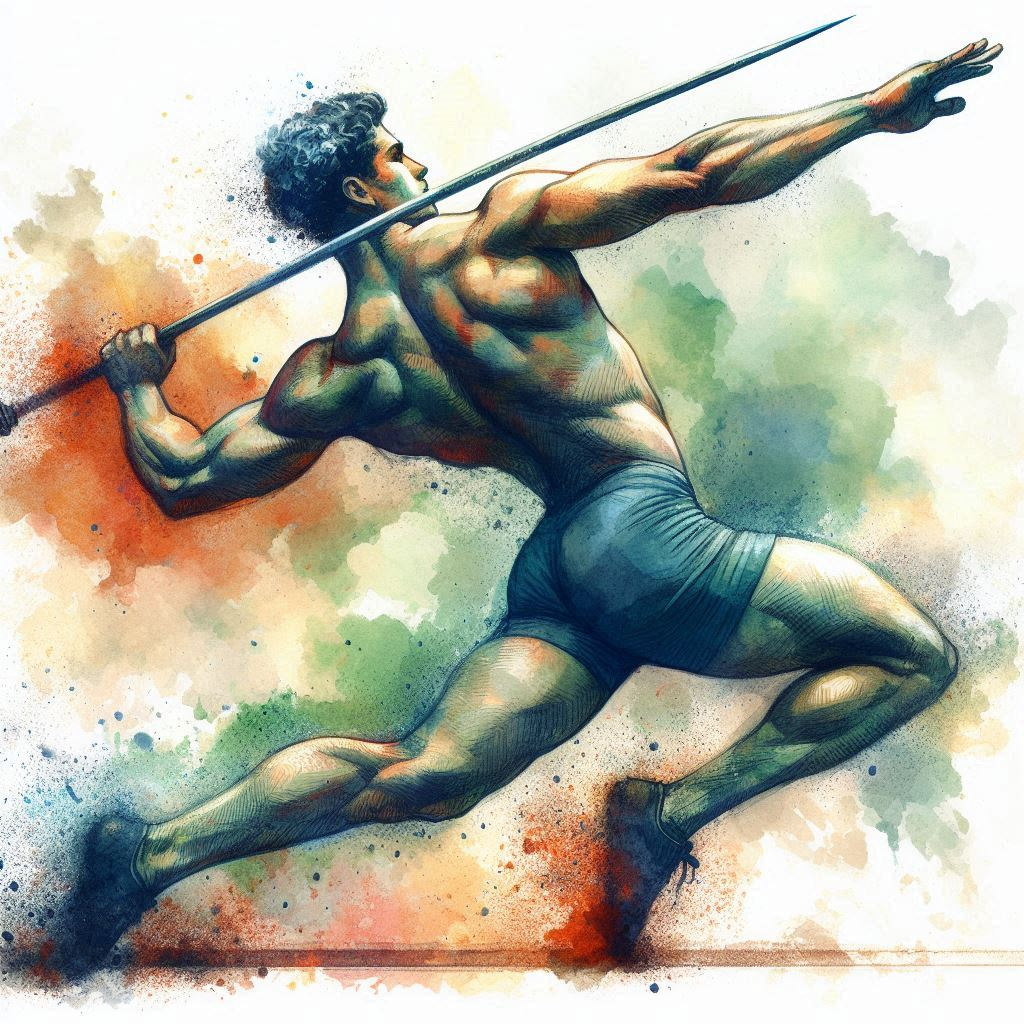
Other events:
As the games went on more events were added.
Sports like the long jump, where instead of having a long run-up, athletes held weights in their hands to gain momentum when jumping… there was even a man with a flute to motivate them to jump further – I’m not sure if this meant he tried to club them round the head with the flute or he played it… probably tried to smack them with it.
There was the pentathlon made up of five events – running, jumping, discus, javelin and wrestling. Running is the only one of those which is in the modern day pentathlon- I know you didn’t want, or need, to know that. But now you do!
Then we had some horse based events lie horse racing and the slightly more dramatic chariot racing. The chariot races were extremely violent with everyone bashing into each others.
The chariot drivers weren’t naked by the way… I suppose it would have distracted the horses.
No matter what the event, if you won an event you were given a wreath of leaves and you became the bee’s knees of your home town. Which event of the Ancient games would you most like to take part in?
Champions of note
Throughout the centuries of the ancient games there were so many champions recorded.
You had six time wrestling Olympic champion Milon of Croton who apparently carried a cow on his back into the arena, killed it and ate it all in front of spectators as part of the big sacrifice for Zeus at the start of games. Would you mess with someone who did that?
Then you have Diagoras of Rhodes who was reported to have been 2.20 meters tall (7 foot 2 inches- almost a foot taller than me). He became boxing Olympic champion in 464 BCE. He was so tall people thought his dad had been a God.
Olympics and Rome
When Rome invaded and conquered Greece in 146 BCE the Olympic games did continue but they weren’t as popular and really it was only people who lived close to Olympia that continued to watch and compete in the Olympics.
In 86 BCE the Roman general Sulla (the first man to seize dictatorship power in the Roman republic by force) actually robbed Olympia of all its treasure to fund a war. He also turned the games in 80 BCE into his personal celebration for all his victories.
When the first Roman emperor- Augustus- came around the Olympics were given more respect and they did go through somewhat of a resurgence. The damaged and neglected Temple of Zeus was restored and the games given funding to keep them going.
Leonidas of Rhodes won the Stadion, Diaulos and Hoplitodromos races at four successive Olympic games. That’s 12 Olympic champion titles in total. No runner of the Ancient Games (or modern games?) has beaten this record.
Nero
Ah Emperor Nero. I’ve given him his own little section in this Not-So-Romantic Blog. He not only wanted to build himself a golden palace he also wanted to be Olympic champion of all the chariot races.
He had the games in 67 CE delayed… and despite falling off his chariot during the racing he was still… somehow …. declared champion! I bet you never saw that coming.
He also saw himself as a talented musician and singer so he had a habit of adding singing competitions to everything … including the Olympics. You’ll not believe this, but he also won the singing competition at the Olympics as well.
After his downfall and suicide the Olympic judges had to return the bribes they’d received and the games were declared void.
The end?
Despite Emperor Hadrian and Antoninus Pious over seeing many success Olympic games, the popularity did start to die off again.
There is a lot of question about when the games actually ended. The last recorded Ancient Olympic games were recorded in 393 CE.
